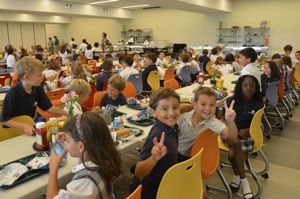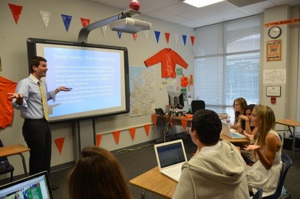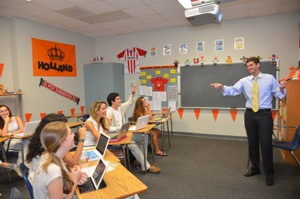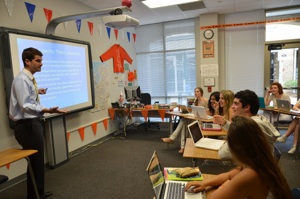Houston Blog
My blog from Houston, Texas. Updated most weeks, usually on Sundays.






Wouldn’t it be wonderful if no-one had to pay for education? Of course, we all know that someone ultimately has to pay, but the ideal of a ‘free’ education that is provided by the government, seemingly at no cost whatsoever to all parents, is promoted in many countries as a way of breaking down barriers of social privilege and maximizing a nation’s future competitiveness. In the US, where government intrusions are often regarded by many people with significantly more suspicion, it’s different.
As an educator, I naturally want as many children as possible in as many countries as possible to have access to the best education possible for as long as possible.
Perhaps surprisingly, the answer seems to be ‘no’, at least according to an article by Conan Businge that was published this week in ‘New Vision’, a leading daily newspaper in Uganda (http://www.newvision.co.ug/news/156-blog-running-schools-gets-messy.aspx).
According to this article:
-
“The day Government started paying tuition for all school going children was the day parents ‘declared’ a holiday from taking care with their children’s education. What a shame.
-
Almost all school management committees became dull. Government stood at a distance and barked, but did not care to bite. Years down the road, the rot seems to be perforating its way through free education’s foundation in the country.
-
A decade down the road, Government is gradually realizing that the parents stealthily put so much weight on its back, and this is gradually eating down the country’s quality of education. “
In his blog, Associate Professor of Politics at Princeton University, Evan Lieberman, cited the article and added some further observations:
-
“I’ve heard much the same thing from various head teachers in Kenya, absolutely lamenting the detrimental effects of free primary education (FPE)! The simple argument is that when parents don’t have to pay, they feel no stake in the school, no obligation to participate in management, and they simply delegate education to government. And because poor people in poor areas are not paying any kind of direct income tax, given low or non-existent incomes, they are not engaged in any type of fiscal contract. It’s pretty painful to think that in trying to provide universal primary education (and beyond) in these East African countries that the plan itself might actually be causing harm to the quality of learning.” (http://evanlieberman.org/2012/08/27/is-free-stuff-bad-for-development/)
I found these articles to be very challenging and thought-provoking, especially as they came just a few days after an article in the New York Times was posing the question “Is Private School Not Expensive Enough?” (http://www.nytimes.com/2012/08/24/opinion/is-private-school-not-expensive-enough.html?_r=2). Written by R Scott Asen, a graduate and former trustee of an independent school in Massachusetts, the thesis of the article was summed up in a few short paragraphs:
-
“Any parent of a private-school child will tell you that tuitions are painfully high — and getting worse every year. Many New York City schools are approaching the $40,000 mark. And it’s not just New York: charges at many private secondary boarding schools are now touching $50,000. Outrageous, many say.
-
But I would argue that, if anything, charges may be too low. At least for some of the customers.
-
Virtually every private-school parent has heard about “the gap” — the difference between tuition dollars received by the school and the actual costs of operating the institution. This information is usually delivered by the development (read fund-raising) office, along with a heartfelt plea to help plug that gap with a donation...
-
In a perfect world we might hope that those with larger capability would voluntarily make up as much of the gap with donations as their resources allow. The problem is, they usually don’t come close.
-
This brings us to a troubling conclusion: To the extent that any family with the wherewithal is paying less than the full cost of the product it is buying through combined tuition payments and donations, that family is effectively being subsidized by other current and past donors. Not only is this ethically unsupportable, but ultimately, it is also financially unworkable.
-
My proposal: Supplement the traditional development model with a new pricing model. During the admissions process, along with quoting the stated tuition, the school should inform all families of the real costs of operation on a per-student basis and, further, tell them that they will be expected to fill as much of the gap between tuition and cost as they are able with a donation. To determine this number, the same level of financial disclosure currently asked of financial-aid applicants will be asked of them, and a means-testing exercise will be used to determine capability. Any family not willing to provide such disclosure would simply be told that the school expected the full gap to be met with a donation.”
In other countries where I have worked, it would have been unthinkable to operate on a budget where fees and other confirmed income (including government assistance in some places) were deliberately designed not to cover basic tuition costs. Here in the US it is different. It is the norm for private schools such as ours to under-budget income compared with tuition fees.
As you might imagine, this places enormous importance on our Annual Fund. It is a measure of Awty’s strong sense of community and enthusiasm for the school that support for our Annual Fund is extraordinarily strong. Last year (2011-12), 91% of our parents and 100% of our faculty and staff gave to the Annual Fund (up from 67% and 56% respectively the previous year). We are just two weeks into the new school year, and yet already 80% of our faculty and staff have contributed to the Annual Fund. I cannot begin to tell you how grateful I am to our volunteer parents who tirelessly chair our Annual Fund – Aimee and Tyler Flood, Jill Munk, Suneeta and Raj Rangwani, and Corinne Rochette.
Because of the importance of our Annual Fund, we will be holding an Annual Fund week in a few weeks’ time (September 24-28). During that week, we will be focusing our attention on a different school “program” each day. This should be a great opportunity for our school community to understand how the proceeds from our Annual Fund make a difference in such diverse areas as the fine arts, athletics, technology, grounds and maintenance, promoting diversity, and supporting scholarships. More information will be available through Awty Notes, so please stay tuned!
Soon after I arrived at Awty a little over a year ago, I found myself having a fascinating conversation with a potential donor. “Tell me why I should donate to Awty”, he said, “when I could give the same amount of money elsewhere and maybe build a small primary school for a hundred students in Africa”. We chatted for a while, and it was obvious that he had set high ideals for himself – he clearly wanted his donation to make a real difference in improving our world and making lives better.
My reasoning was that Awty’s students generally have high aspirations, enormous idealism, and a deep passion to help others. Every Awty student who puts these ideals into practice during his or her life has massive potential to improve the lives of thousands of other people – just think of the potential for good there is in every economist who works for the World Bank, or every journalist who exposes injustice, or every artist who helps others to reflect on their priorities, or every teacher who forms the minds of hundreds and maybe thousands of young lives, or every lawyer who battles tyranny and discrimination, or every doctor who cures illnesses and saves lives.
And the evidence provided in articles such as the one I mentioned above from Uganda’s ‘New Vision’ would seem to validate my viewpoint. Therein lies the challenge in life that I place before every Awty student—the hope, the aspiration, the imperative—and from this flows the rationale to support our students’ education by giving generously, thoughtfully, and reflectively.
Free education would be wonderful, wouldn't it?
Sunday, 2 September 2012
Our new cafeteria has opened and we hope to be serving hot food in about a week from now. Almost every classroom is now equipped with interactive whiteboards, and the BYOD program is bringing technology into every classroom whenever the teacher requires it. Yes, we are off to a great start for the new school year!









